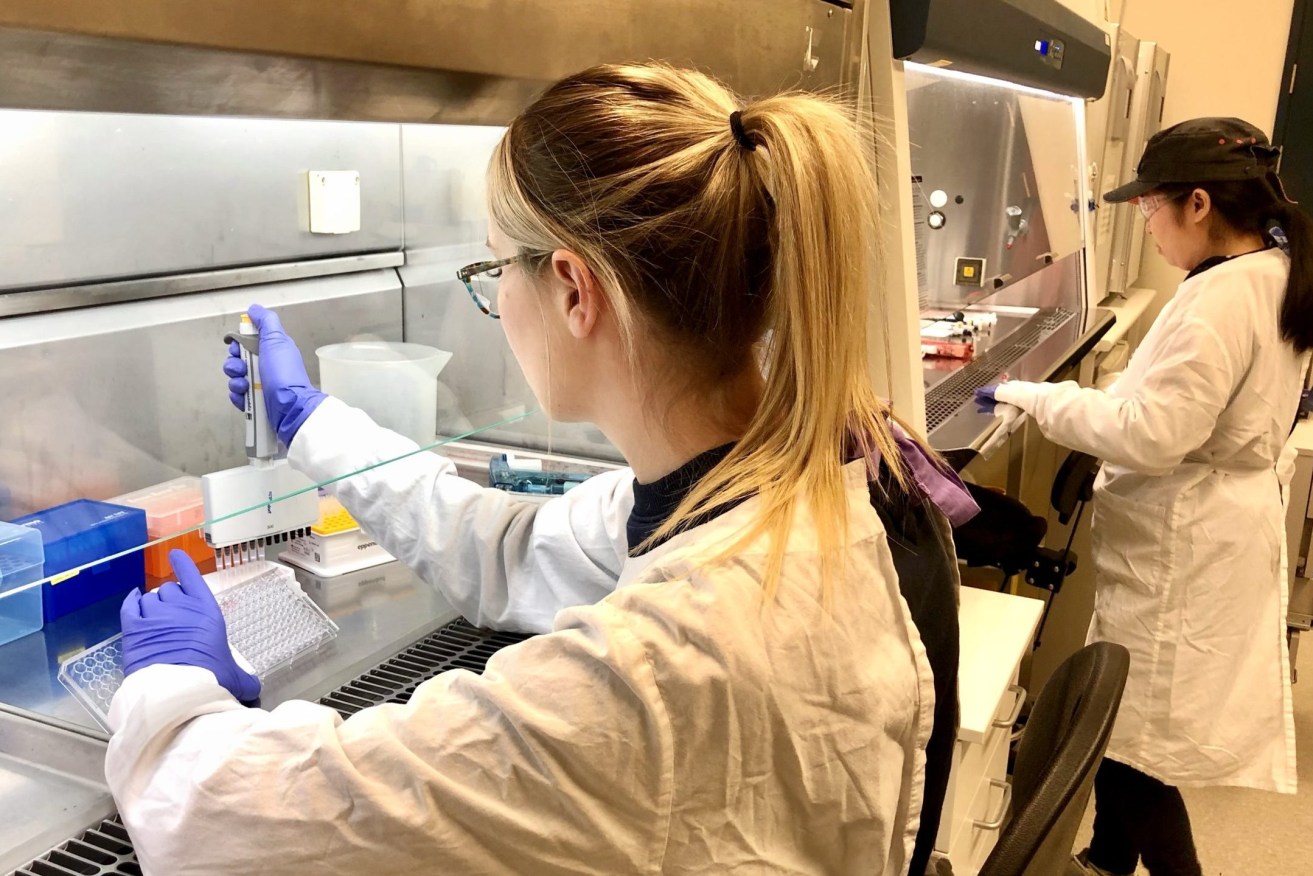Double shot: Queensland researchers say new drug can prevent, contain virus
Queensland scientists have added even more potent firepower to the world’s pandemic-busting arsenal, creating two new drugs that lock coronavirus out of human cells and block it from spreading in people who may have already been exposed.


Researchers believe they are close to a breakthrough in protecting against a potential pandemic virus.
The major breakthrough, published overnight in the journal Nature Cell Discovery, could help boost the effectiveness of vaccines globally and treat people suffering severe COVID infections.
The first drug acts as a “padlock” to stop the virus from invading human cells, while the second blocks the ability of the virus to spread if it has already penetrated.
The discovery by QIMR Berghofer Medical Research Institute scientists comes just days after another group of Queensland scientists, from Griffith University, revealed they had also developed a new breakthrough. Their “seek-and-destroy” therapy stops coronavirus replicating and can destroy the virus growing in a COVID sufferer’s lungs.
Senior researcher and head of QIMR Berghofer’s Gene Regulation and Translational Medicine Group, Professor Sudha Rao, said the key difference in the new discovery was that the drugs target how human cells respond to the virus, instead of the virus itself.
The scientists had uncovered just how SARS-CoV-2 invaded cells and caused COVID-19 disease, she said.
“This is very novel and unique because for the first time you are really getting an understanding of how the virus is able to exploit human cells,” Rao said.
“Once we understood that, with our expertise and drug development we were able to develop one drug that basically acts like a padlock that prevents the virus from entering, and then if there is any leakage and the virus enters, then the other drug prevents the virus from replicating.”
She said some people had a chemical tag that acted like a padlock on a receptor protein on human cells called ACE2.
“The tag can either keep the receptor locked or open, controlling infection. This means people who have the padlock-like tag on their ACE2 receptors will be less susceptible to SARS-CoV-2 and those without the tag are more vulnerable to infection.
“Our drugs stop the tag from being removed and also protect the untagged ACE2 receptors from being infected.”
Laboratory tests show the first peptide-based drug reduced infection by cloaking the ACE2 receptor that the virus latches on to and uses to invade cells.
When the drug was used, the virus instead attached to the cloaking peptides, mistaking them for human cells, which effectively locked the virus out.
The lab tests also demonstrated that if the virus did find its way into cells, the second peptide-drug could block how the virus hijacked the host cell and began replicating. It also boosted the immune system’s ability to recognise the virus.
Rao said the drugs complemented other discoveries and supported the global vaccine roll out.
“At the end of the day, COVID 19 is here to stay and we are going to need many tools in our toolbox,” she said.
“Our drugs are really there to block the virus at its very early stages. In tandem, the vaccine is there to mount a specific immune response against the virus, so they are really complementary approaches.”
She said early testing showed the new drugs were safe and effective against all currently identified variants. There were also stable and could be stored at room temperature.
As a result, they could be made and distributed worldwide to help attack the virus from a number of angles, she said.
“We’ve known for a long time, for example in oncology, that the combination approach is the way to go. I think we are going to need both – vaccines are essential and critical in the armoury but with these drugs we can prevent the early build-up of the virus.
“We also know the vaccine isn’t the silver bullet. There are many members of our community who cannot take the vaccines and we know the vaccines don’t work as well for elderly members of our community. So therefore, you are going to need different tools to tackle this.”
The QIMR Berghofer Medical Research Institute research was conducted on COVID-19 patient blood and human cells. The drugs are now being tested in France.
Rao said the international collaboration with French researchers and funding from the Queensland Government and philanthropic donors had accelerated the research which meant the drugs had been developed in around 10 months instead of years.
Professor Nabila Seddiki, who is testing the drugs at the Infectious Disease Models and Innovative Therapies clinical research facility in France, said the new drugs were an exciting step in the fight against COVID-19.
“Many of the drugs being developed around the world to treat COVID-19 are targeted at people with severe disease. However, these peptide-based drugs are aimed at preventing infection in the first place, and at reducing the severity of the disease before it really takes hold,” Seddiki said.
“These drugs could also be very important because they may provide the protection we need for emerging variants and be used to protect the small group of people who cannot be vaccinated.”












